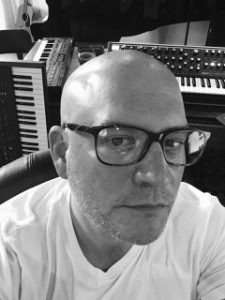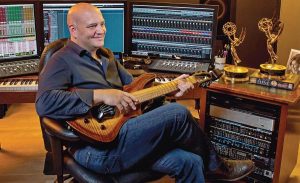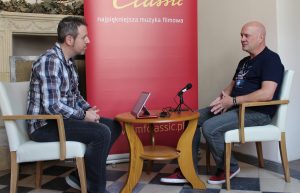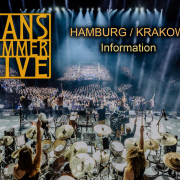Trevor Morris – Interview
Today it is time to rescue and publish an interview that has spent some time in the archives of SoundTrackFest; an interview with composer Trevor Morris, conducted during the Krakow Film Music Festival 2017 by Gorka Oteiza.
In this interview Trevor Morris talks about his beginnings, his work in the TV series Iron Fist, Emerald City and Taken, how is composing music for video games, and also gives some suggestions for composers who are starting in the film music world.
INTERVIEW
Let’s talk first about your beginnings in music. How and when did you start getting into film music world? Is there a moment you remember saying: Wow, this is what I want to do! … Or was it a gradual process?
I was in my early twenties. I was writing music for commercials, and that was the first time they gave me an image. And when you put music against an image, well, that’s when you realize that when they’re together they become bigger.
So I fell in love with music to picture, and I decided that I wanted longer than thirty seconds to I say what I wanted to say (*laughs*). That led to me think; ok, I want to be in film and TV.
I was living in Canada at the time and there wasn’t room for me in the business, so I decided to go to Los Angeles, because that’s where they make movies and television. Pretty easy choice! That was really when I knew that I wanted to somehow compose music for images and have them come together.
Which instrument would you consider to be your “main” instrument? The one you learnt with? Do you have a tendency to use any particular instrument in your soundtracks?
I learned the piano first, which is a good instrument for a composer because it has the widest range. I play some violin, some cello, guitar, but not very well; I learned those as a kid. Really piano is my instrument. But if you’re going to write for an orchestra, you need to understand how all the instruments work, so, I can’t play the French horn, but I know exactly how it works and exactly what it can do what it can’t do, and that’s part of the job. I usually start composing at the piano, but then I use all the orchestra, so I don’t have any special tendency to use one particular instrument.
You have focused your career on TV Series, or at least you work for so many TV series, that looks like it’s your main focus. The Borgias, The Pillars of the Earth, Vikings, Emerald City, Taken…. Was there a transition from when you started composing commercials and ended so immersed in the TV world? Or you really knew you wanted to compose for TV since your beginning and just went for it?
I’ve composed for movies too, but not too many. Now TV and movies are coming to be almost similar. I think that you sit at home and years ago used to be movies on the big screen and TV on the small screen; but now it’s the same screen, doesn’t matter if you’re watching Emerald City or Transformers. So my decision is just to write music for good stories, it doesn’t really matter if it’s TV or movies; to be honest I think that best stories are told on television now. But either one is fine, I like both the same.
Working on TV and movies is completely different, not only the schedule but also the story. On a movie, you know the whole story while on TV you get the main plot and it can evolve in ways you didn’t expect when you were composing. How do you deal with that?
That’s very true. When you have a movie you get to know everything when you start. On TV I try to ask the producers where we’re going with this character, who’s going to be around for the whole time, who’s going to get killed off, who’s not important… Because if you don’t ask, you don’t know. Well, sometimes they don’t know, they’re making it up as they go (*laughs*).
Things on TV move very quickly, so I think part of the job is being able to react quickly. With a movie you have time to create a space for a month or two or three and then you just know what you’re doing, but TV doesn’t work like that. They’re different disciplines. So you have to think different and be fast.
When you’re working for TV, how is your regular schedule? How does it go from episode to episode?
I’d say that the average for a TV episode is five or six days, but sometimes it’s three days! It’s really hard! If the schedule is relaxed, you have almost two weeks. That’s the longest period I’ve had. But that’s not usual, so I work on a 5-6 days periods.
Let’s talk now about video-games, it’s a genre you’ve also touched with your music like in Dragon Age, Army of Two, Need For Speed: Carbon…. How is it working for video games, a genre totally different from movies and TV?
The process of composing for a video game is very complex because you have to think non-linearly. TV and movies have a start and have an end, and that’s it. Video-games are chopped down in pieces and then you move around like in a Rubik’s cube and different music has to appear. So you have to understand how the music is going to be used, that’s really the trick, and what they’re going to do with it. You never really hear it until you play the game, and every time you play it’s different. It’s like shaking a box and getting something new each time. So the approach is to make sure you understand how the music is going to be used, and sometimes, to see if it loops smoothly and can be put in little boxes. It’s a complicated process, and now that I know how to do it it’s ok… but at first, it was very tricky!
When you’re creating a soundtrack for a video game and then want to deliver the final result, do you use computer-generated music or you try to use an orchestra/ensemble?
Usually, there’s the main title, like in Dragon Age, and then there’s what’s called “cinematic”, which is usually this N-minute long movie you see when you get to a certain point or level. Usually, both of them are played with an orchestra, because they’re like mini-movies. But then in the game there’s a lot of ambient music, just to fill in spaces, and they’re not big, just small. So usually those ones are computer generated; just textures and ambients to make you feel things.
From your experience, what advice would you give to new composers or people studying to be composers for their careers?
You know, I’ve always supposed there’re two ways to go. One is to do independent movies and student films and you build your career one brick at a time that way, which I think it’s great, but I went the other way which is to be a composer’s assistant or apprentice. That way you get to learn from somebody who is already working, because there’s so much you don’t learn in school or in a book or on the Internet, and you only learn by doing it, by being in the room and seeing a director reject a cue, by making mistakes. If you work as an assistant helping an existing composer, you get to learn the real world without being your name on the poster, so that’s what I would recommend. That’s what I did, and I still think it’s a great way to go.
Let’s talk about the some of your last TV shows that we are having the opportunity to enjoy… Like Iron Fist, Taken and Emerald City. Can you give us an idea of what’s behind the music of those shows, how did you approach them?
Well, they’re completely different. With Emerald City, after going all the way round, it ended being up primarily orchestral. We recorded live in London at Abbey Road very much like a movie score. Taken is based on Liam Neeson’s movies, it has a muscular tone, he’s an action dude and so the music follows that pattern. Iron Fist, which is a superhero type thing for Marvel… well, that’s completely 100% electronic, no orchestra. I enjoyed that one very much, because it’s fantastic to conduct an orchestra one day and then be trying filters the next day to get the appropriate sound. So they’re very different from each other.
Emerald City unfortunately didn’t get picked up, it’s a good story, but those things happen. Taken has a Season 2 and we’re doing a little bit of a musical change for it, and Iron Fist, well he’s not Iron Man, he’s not flying around, he’s just a normal guy who has this one superpower and the audience for that show is younger.
He is one of the four Marvel’s Defenders (with Jessica Jones, Luke Cage, and Daredevil), so the showrunners wanted something complementary in his music; Sean Callery’s score for Jessica Jones is something a little jazzy, Luke Cage is Hip-hopy, Daredevil is a little orchestral, so Iron Fist put the synthy-electronic contrast on the gang. It creates a different feel.
How do you deal when you’re working on many different shows at the same time? Do you follow some rules, schedules, tips & tricks?
I do work on many shows at a different time, and it’s funny, and even Emerald City came out on at the same time as Iron Fist and Taken, in fact, I finished Emerald City in 2016, so we finished it 6 months before it was aired. I usually have space between shows, even if looking at their schedules seems that they were composed at the same time. It’s true sometimes they do overlap a little bit, but they don’t stack-up so much.
And now to finish the interview, one final question: from all the projects you have worked on, is there some project you’d like to rescue for the public? Some project you really liked?
I did a really great TV series called Kings a long time ago, and it had a really good soundtrack, which unfortunately didn’t get released. Maybe I’ll self-release it someday. It was one of the best TV shows I’ve ever worked on and it didn’t get picked up. Well… who knows why shows get picked up or not… That’s a show that if they brought back today, I’d be happy to be there again!
That’s a good story! Thank you very much for your time, Trevor.
Thanks to you and a big hug to my Spanish friends!
Interview by Gorka Oteiza














